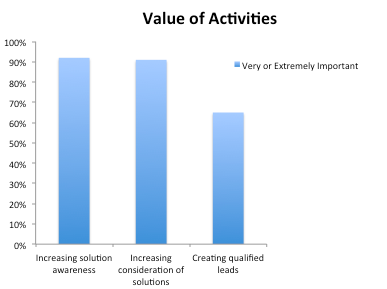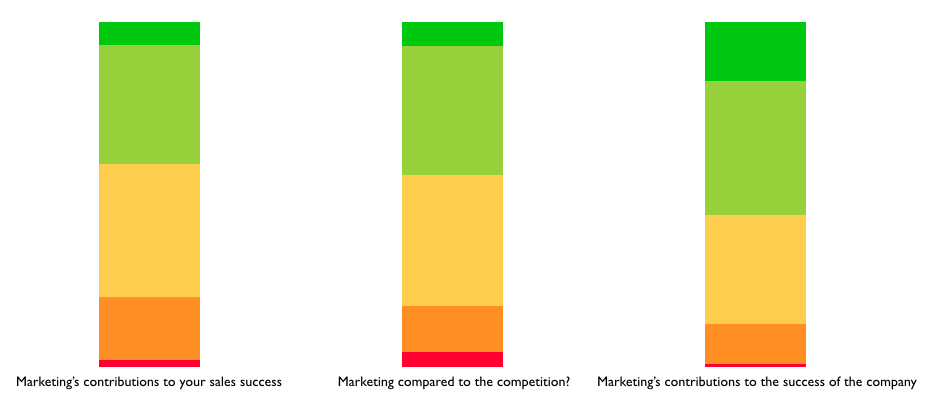
10 Tips for Recession Proofing Your 2020 Marketing Budget
by Scott Gillum
Estimated read time: 4 minutes
Over the last few months, I have had the opportunity to attend industry events, review new research on buyers and sellers, work with clients on very difficult challenges and observe the behavior of sales and marketing teams working together… and I’m worried.
I’m worried because of the following. Albeit a small sample size, I am seeing the issues below across organizations of various industries, big and small.
– Confusing Activity for Performance, Again
Despite our ability to measure more than ever I have observed organizations rushing campaigns out the door without proper performance metrics defined and/or proper mechanisms in place to capture performance data. And when flagged, the client took a pass on putting them into place because it would take “too much time.” The behavior of go, go, go is pervasive.
– Overreaching Procurement and IT
This observation is unique. It’s the first time I’ve ever seen the procurement and IT group change the requirements on making a purchase decision. The group changed the client sponsor’s key decision criteria to bring in their preferred vendor costing more than $100,000 above the next highest bid. The owner of the work did not get what they wanted and the organization ended up paying more for it. Someone has too much budget.
– Basic Building Blocks are Missing or Skipped
Database quality is owned by everyone, and no one, customer profiles lacking basic information (like emails), performance metrics are missing or not being tracked, process metrics are in place but not used, call list are not being bounced up against do not call list, agencies lacking knowledge on their clients customers and products, and on and on and on.
– Lack of Accountability
Large chunks of money being dropped on media without accountability on the performance of the spend, and sales comp not aligned to organizational revenue objectives and goals. Also see bullet above.
– Silver Bullet
Related to bullet #3, over reliance on the MarTech stack to fix basic problems that they were not intended to fix. The ramping up of Data Science departments to run sophisticated analysis on data that they may, or may not, realize is compromised. Marketing investment decisions being made using outdated marketing optimization models that only output “spend more” recommendations.
– Status Quo
Lack of courage or motivation to make difficult decisions that would impact performance for fear of being disruptive. Control issues that prevent real change from being made by team members who see opportunities to improve performance but may be perceived as threatening to others. “Things are good, don’t rock the boat.”
– Doing the Dirty Work
This is the most disappointing of all of the things I’ve observed. Good marketing is hard work. It requires research to understand buyers, products and competitors. And guess what, it takes time. Recently, I was in a meeting about a new positioning for the organization. Everyone was excited by the idea but the marketing team lost it’s enthusiasm when they heard the amount of work needed to take to bring the idea to life in a campaign. Breakthrough work requires ergs of effort to make it great. It’s the price you pay…get over it.
Much of what I have observed are symptoms of good economic times. Organizations flush with budgets, high demand for products and services, and growing profits are causing organizations to operate inefficiently. The reason this is so concerning is because we’ve seen this movie before, most recently in 2008.
Things are in motion. The trade war, the presidential election, candidates promising to come after industries and corporate profits, big tech getting squeezed by governments over their size and privacy issues.
For the past five years we’ve been able to get away with average efforts. Strong economies and demand bring about waste. “Doing” became more rewarding than “thinking.” Put more in the top and even more comes out the bottom. But those days are numbered.
Being smart about what you do and why, will become a necessity again. Doing more with less will become the reality. So as you do you 2020 planning, have a mindset that a recession is coming. Try taking an approach that assumes you have 20% less budget than last year. Here are 10 things to consider.
- What would you cut to reach a 20% reduction, and why? Lay out 3-4 different scenarios.
- What would you invest in in Q4 2019 to set you up to be more efficient in 2020?
- If you had to turn off 2-3 tools what would they be, and why?
- If you had to shut something down to reinvest to get a better return what would it be and where would you put the money?
- Could you move something off of your budget line and onto someone else?
- Are you paying for something that you shouldn’t or it benefits some other group?
- Could you centralize something and get greater efficiencies?
- Could you consolidate vendors to be more efficient?
- Could you do less and produce better results by sticking to a limited set of priorities?
- Could you have one centralized campaign and tie it to several products/markets or goals?
The goal is to become 20% more efficient. Even if the recession doesn’t come next year you’ll be able to clean up some of the sloppiness that comes with good economic times.
Subscribe Here for thoughtful content on how to ‘think differently’ on marketing, business, and work.








